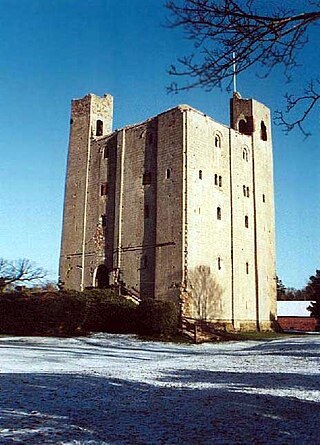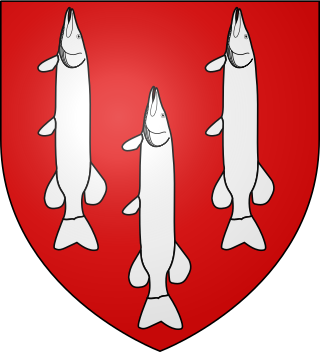
Ickleton is a village and civil parish about 9 miles (14 km) south of Cambridge in Cambridgeshire, England. The village is beside the River Cam, close to where a southern branch of the Icknield Way crossed the river. The eastern and southern boundaries of the parish form part of the county boundary with Essex, and the Essex town of Saffron Walden is only about 4.5 miles (7 km) southeast of the village.

Egremont is a market town, civil parish and two electoral wards in Cumbria, England, and historically part of Cumberland. It is situated just outside the Lake District National Park, five miles south of Whitehaven and on the River Ehen.

Aubrey de Vere, 2nd Earl of Oxford, hereditary Master Chamberlain of England, served in military campaigns under King Richard and King John. He was succeeded in the earldom by his brother, Robert de Vere, 3rd Earl of Oxford.

The title Baron Multon de/of Egremont was created once in the Peerage of England. On 6 February 1299 Thomas de Multon was summoned to Parliament. On the death of the second baron, the barony fell into abeyance in 1334.

Robert FitzWalter, 1st Baron FitzWalter was an English landowner, soldier, administrator and politician.
Sir Thomas Moulton was an English landowner, knight, admiral and judge during the reigns of King John and King Henry III. From a family with landholdings in the south of Lincolnshire, he was the son and heir of Thomas Moulton and his wife Eleanor Boston. After initial military service, he became a senior judge and held important government positions, in the process extending his inherited estates and accumulating considerable wealth.

de Lucy or de Luci is the surname of an old Norman noble family originating from Lucé in Normandy, one of the great baronial Anglo-Norman families which became rooted in England after the Norman conquest. The first records are about Adrian de Luci who went into England after William the Conqueror. The rise of this family might have been due to Henry I of England, although there are no historical proofs that all de Lucys belonged to the same family. The family name is Gallo-Roman, mentioned in 616 as Luciacus, Lucy, Luci, Lucé derived from the Latin cognomen Lucius, meaning "born with the daylight" or Gaulish Lucus, Lucius, Lucco from Loco- / Luco- possibly "wolf" + suffix -(i)acum "place, property" of Gaulish origin.

Baron Lucy is a title that has been created four times, three times by tenure and once by writ, which means that the peerages could descend through both male and female lines. The first creation by tenure came in the 12th century with Chief Justiciar Richard de Luci. In 1320, the title Baron Lucy was created in the Peerage of England by writ of summons dated 15 May 1320. The title Baron Lucy has been dormant since 1398.

Thomas de Multon, Lord of Egremont, was an English noble.

William de Braose, was the first Baron Braose, as well as Lord of Gower and Lord of Bramber.

Richard Óg de Burgh, 2nd Earl of Ulster and 3rd Baron of Connaught, called The Red Earl, was one of the most powerful Irish nobles of the late 13th and early 14th centuries and father of Elizabeth, wife of King Robert the Bruce of Scotland.
John of Monmouth was an Anglo-Norman feudal lord of Breton ancestry, who was lord of Monmouth between 1190 and 1248. He was a favourite of both King John and his son, Henry III, and one of the most powerful royal allies in the Welsh Marches.

John Harington, 1st Baron Harington (1281–1347) of Aldingham in Furness, Lancashire, was an English peer, created Baron Harington by writ of summons to Parliament dated 1326.
William Meschin was an Anglo-Norman nobleman and baron. The brother of the earl of Chester, Meschin participated in the First Crusade. After returning to England, he acquired lands both from King Henry I of England and by his marriage to an heiress.
Ranulf de Vaux, also known as Randolph or Ranulf de Vallibus, Lord of Triermain and later Lord of Gilsland, was a prominent 12th-century English noble.
Hugh de Morville Baron of Burgh, Lord of Kirkoswald, was an English noble.
Thomas II de Multon Baron of Burgh and Gilsland, was an English noble.
Lambert de Multon Baron of Copeland, Lord of Egremont, Lord of Moulton who also held lands in Fleet, Moulton and Sutton, was an English noble.
Alan de Multon, Lord of Papcastle, who held lands in Cockermouth, was an English noble.
Reginald de Luci, also known as Reynold, was an English noble.









